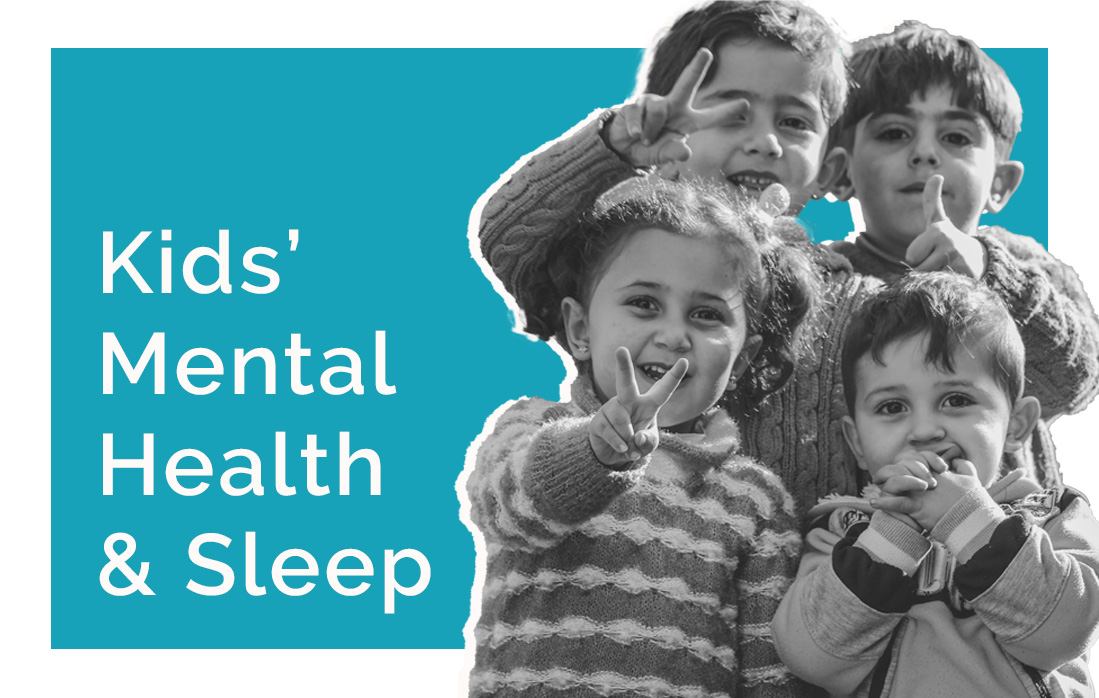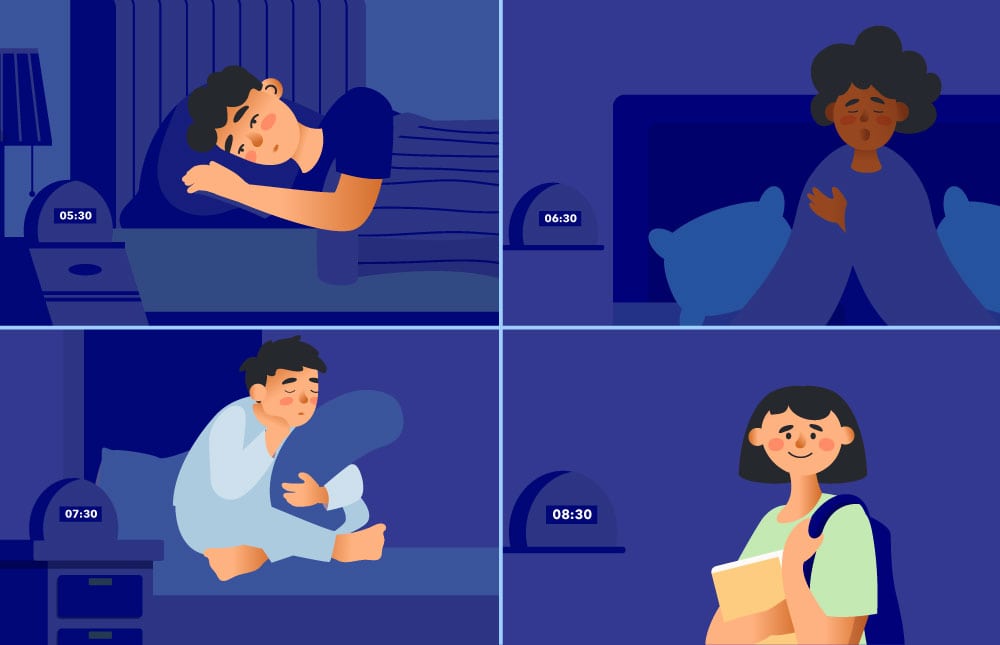
The link between sleep problems and suicide is, sadly, pretty well-established. But new research shows that children and young adults with sleep disorders, specifically, have a higher risk for suicidal thoughts.
The researchers, whose results were published in Sleep Health Journal this month, looked at records of young people between age 6 and 24 who visited emergency departments between 2015 to 2017. They found that young people with sleep disorders were three times more likely to go to an emergency department with suicidal thoughts than those who didn’t have sleep disorders.
The likelihood of suicidal thoughts was over 46 percent higher in young people with a mood disorder and sleep disorder. It was 47 percent higher in youth with a psychotic disorder and sleep disorder, compared to youth without a sleep disorder. Yet only 0.32 percent of youth that went to a hospital for suicidal thoughts were diagnosed with a sleep disorder. (We know that about 9.4 percent of youth in the U.S. have insomnia, and about 6 percent probably have sleep apnea.)
The odds of a suicide attempt were 48 percent higher in young people with a sleep disorder compared to those without a sleep disorder. And that didn’t take into account any psychiatric diagnoses.
Though they found a link between sleep disorders and suicidal thoughts in young people, the research doesn’t show that sleep disorders necessarily cause suicidal thoughts. But it does show that sleep disorders could put people at risk for them.
“People so often think of sleep disorders as being a symptom of other mental health problems like depression or anxiety,” Melynda Casement, an associate professor at University of Oregon, said in a statement. “But sleep problems can also contribute to anxiety, mood disorders, and suicide risk.”
Just one bad night of sleep can impact our mood, memory, and executive function. Ongoing sleep woes have been linked to having a higher risk for anxiety, depression, and bipolar disorder.
Disrupted sleep is also a symptom of several psychological disorders such as major depressive disorder, anxiety, post-traumatic stress disorder, and bipolar disorder, Daniel Katz, PsyD, a psychologist and founder at Houston Therapy in Texas, told Sleepopolis.
“If someone is struggling with suicidal ideation, disrupted sleep will make it harder to see that there are alternatives to suicide and harder,” said Katz, who wasn’t involved in the research.
“People generally think about suicide when they are overwhelmed and they are not able to soothe and regulate their emotions. Lack of sleep greatly inhibits one’s ability to think clearly, soothe, and emotionally regulate. This can often exacerbate suicidal thoughts,” Katz added.
The U.S. Centers for Disease Control and Prevention reports that suicide is the second highest cause of death in young adults.
Targeting Sleep to Prevent Suicide
Casement thinks that screening young people for sleep disorders when they come to the hospital could show if they’re at risk for suicide.
“Being aware of the impact of sleep disruption gives us an avenue to try to address sleep issues as well as downstream consequences,” said Casement, who is currently studying if better sleep quality can improve mental health in children and young adults.
Despite the recommendations, David A. Jobes, PhD, a professor and director of the suicide prevention laboratory at The Catholic University of America, doubts that will happen. He was not on the research team.
“Emergency department providers are so overrun with complex medical presentations, oftentimes they fail to even do the basics around assessment and intervention,” Jobes said. “Adding an evaluation beyond a mere question about sleep seems unlikely to me.”
The Sleep-Suicide Connection
This isn’t the only research on the link between suicide and sleep problems—in fact, there’s a lot on the topic, especially in recent years.
A 2017 study found that sleep problems can be a warning sign that suicidal thoughts are getting worse in young people—even when they put aside depression severity, substance use, and suicidal symptoms. When sleep and wake times differed, suicidal thoughts got worse the days and weeks after sleep and wake times varied, the study found.
“Suicide is the tragic outcome of psychiatric illness interacting with multiple biological, psychological and social risk factors,” lead author Rebecca Bernert, PhD, an assistant professor of psychiatry and behavioral sciences at Stanford University, said in a statement.
“Sleep disturbances stand apart from other risk factors because they are visible as a warning sign, yet non-stigmatizing and highly treatable. This is why we believe they may represent an important treatment target in suicide prevention,” Bernert noted.
But in 2020, researchers said that sleep problems were “statistically significant, yet weak” risk factors for suicidal thoughts and actions. That team identified insomnia and nightmares as the top conditions that may predict a suicide attempt. But they questioned relying on sleep disturbances as a warning signs that someone may soon attempt suicide.
Just a year later, scientists found that teenagers who got less than six hours of sleep nightly were three times more likely to think about suicide, plan an attempt, or make an attempt than teens who got eight or more hours of shut-eye per night.
A small 2022 study reported that sleep issues are a modifiable risk factor for suicidal thoughts. The researchers found that adults with sleep disturbances had more active suicidal thoughts the next day (like “I want to die,”), but not passive ones (like “Life is not worth living for me.”) The authors urged that future research should focus on coming up with sleep-centered intervention strategies to prevent suicide.
What To Do
As for what could link sleep disturbances to suicidal thoughts, Jobes says we know that lack of sleep contributes to irritability and loss of impulse control. But lack of sleep is not a single factor that can cause suicide.
If you’re having suicidal thoughts, look into whether or not you may have a sleep disorder.
“Getting sleep is critical to mental health,” Jobes said. (It can also affect the way a child’s brain develops.)
Jobes said parents should know that sleep issues are problematic for young people.
“There can be value in seeking care and improving sleep hygiene,” he added.
But Katz said not everyone with suicidal thoughts should have a sleep disorder assessment. It’s worth thinking about if you or your child have sleep issues and also feel suicidal, Katz explained.
Common questions to ask your child, Katz said, include: Is it easy to fall asleep and stay asleep? What is the quality of sleep? Do you feel rested when you wake up? Do you ever find yourself going to sleep at times throughout the day?
“Generally being curious and kind while talking with your child about sleep is the best approach to find out any potential issues,” Katz added.
Toni Abelseth, a psychiatric and mental health nurse practitioner from North Dakota, who wasn’t involved in the research, said more people need to know about the importance of sleep and how much sleep young people need based on their age.
“By recognizing signs and symptoms, screenings can occur with their primary care provider so that appropriate testing, referrals, and possible cause to their sleep issues can be explored,” Abelseth told Sleepopolis.
What Parents Should Look Out For In Their Children
Think your child may have a sleep disorder? Abelseth said the signs may include:
- Frequent snoring or breathing difficulties during sleep
- Excessive daytime sleepiness or difficulty waking up in the morning
- Restlessness or movement during sleep
- Nightmares or night terrors that occur frequently
- Bedwetting beyond the age when it is considered typical
- Difficulty falling asleep or staying asleep consistently
- Behavioral or mood problems during the day, such as irritability or hyperactivity
Parents should be aware of changes in their child’s behavior and any mood shifts, including statements such as “I’m so tired of everything,” Alexis Cate, a social worker from New York, told Sleepopolis.
It’s important for medical practitioners to take sleep complaints seriously because there could be an additional underlying diagnosis or concern, Cate said.
“An ongoing lack of sleep will likely increase sadness, hopelessness, and negative thoughts,” she said. “It is beneficial to get a full medical and psychological workup to attest for additional concerns that contribute to suicidality, such as disordered sleep.”

A Complete Guide to Kids’ Mental Health and Sleep

How Later School Start Times Are Going, According to Real Teens and Their Parents

A Student’s Ultimate Guide to Great Sleep in College

What’s Behind the Viral Video Claiming Less Than 6 Hours of Sleep Is “Suicide”?
Sources
Jason T. Carbone, Melynda D. Casement, Sleep disorders and relative risk of suicidal ideation and suicide attempts in youth presenting to emergency departments, Sleep Health, 2024, ISSN 2352-7218. https://doi.org/10.1016/j.sleh.2023.05.014.
de Zambotti M, Goldstone A, Colrain IM, Baker FC. Insomnia disorder in adolescence: Diagnosis, impact, and treatment. Sleep Med Rev. 2018 Jun;39:12-24. doi: 10.1016/j.smrv.2017.06.009. Epub 2017 Jul 1. PMID: 28974427; PMCID: PMC5931364.
Katz, Daniel. Author interview. June 2024.
Cate, Alexis. Author interview. June 2024.
Abelseth, Toni. Author interview. June 2024.
Jobes, David A. Author interview. June 2024.
Effects of sleep duration on neurocognitive development in early adolescents in the USA: a propensity score matched, longitudinal, observational study. Yang FN, Xie W, Wang Z. Lancet Child Adolesc Health. 2022 Jul 29:S2352-4642(22)00188-2. doi: 10.1016/S2352-4642(22)00188-2. PMID: 35914537.
Rebecca A. Bernert, PhD; Melanie A. Hom, MS; Naomi G. Iwata, MSc; and Thomas E. Joiner, PhD. “Objectively Assessed Sleep Variability as an Acute Warning Sign of Suicidal Ideation in a Longitudinal Evaluation of Young Adults at High Suicide Risk,” Psychiatrist.com; June 28, 2017.
